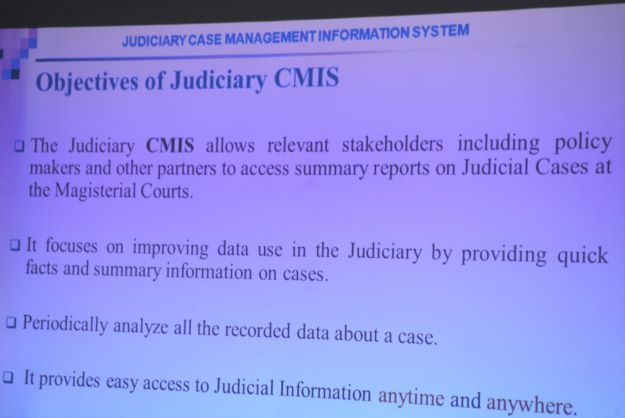In every field of human endeavour, we must always ask ourselves whether there is a better way of doing things. As the digital space increasingly provides opportunities for efficiency, judiciaries should not be left behind in leveraging smart and innovative tools to deliver more efficient justice services.
For decades, costly and inefficient manual systems have been used for filing cases and keeping records in the justice sector. Now, the opportunity to harness the potential of digital tools as part of a wider process of transforming the Judiciary of Liberia is a reality.
In partnership with UNDP, the Judiciary of Liberia has launched an online Case Management Information System (CMIS) which provides a meaningful opportunity for systemic change and transformation of the administration of justice. The CMIS improves data collection, analysis and use, by providing quick facts and summary of information on cases, anywhere and at any time.
The system will enable the Judiciary to track both criminal and civil cases online in real-time and measure the rate of case disposal. This will in turn enable the Judiciary to take appropriate measures by assigning additional judicial officers to areas with high numbers of cases in court dockets, high rates of pre-trial detention and prison overcrowding. Further, the capacity to keep track of all cases will minimize the number of persons whose matters fall through the cracks, causing them to be forgotten in prison. CMIS will ultimately ensure that cases are processed faster. A similar system has already been deployed at the Liberia National Police and is up and running.
This innovative leap relies on open-source software which is free and adaptable for developing secure platforms geared towards improving the quality and efficiency of service delivery. While harnessing the power of digital technologies, the development and roll out of CMIS took into consideration and sought to overcome the challenges associated with scaling-up and sustainability in five key respects.
First, the CMIS is country specific and a sound example of leveraging on the low costs and adaptability of open-source technological solutions to create a system which suits the needs of the Judiciary. In this regard, cases can be uploaded offline, thereby ensuring uninterrupted use of the system in remote areas with low internet connectivity. Cases uploaded offline become active and are updated on the system as soon as internet is available. This ensures the use of the digital infrastructure at minimal costs, thereby ensuring affordability and accessibility for a low-income country like Liberia.
Second, the system is home grown. It was developed by a Liberian ICT specialist who is also familiar with the local legal terrain and culture. The system developer worked closely with the end-users, to customize the CMIS to address their needs. This means that the end-users know their systems in detail and can therefore, maintain and upgrade them in the future to suit their evolving needs. The developer further trained selected judicial personnel who are rolling out the training to other personnel. In this regard, the Judiciary has a modern digital information management system they can truly call their own.
Third, the development and roll out of the CMIS has been progressive and iterative. The process commenced with the development and roll-out of the police system in 2021. Consequently, periodic sessions will be organized to learn from each stage of the roll out and improvements made as implementation progresses. The ultimate goal is to integrate the systems and establish a harmonized case management system for the entire justice chain.
Fourth, having regard to the fact that new systems often face resistance, a period of change management needs to be infused into implementation to allow for personnel adaptation. During this period, personnel will be encouraged and constantly mentored to transition from manual to digital applications.
Fifth, the system is infused with a monitoring framework that will actively provide feedback to ensure that targets are met.
In terms of implications, one may say that CMIS will position the Judiciary to deliver better services to citizens. The CMIS will increase efficiency in case disposal, reduce case backlog and address pre-trial detention. Additionally, the system will serve to ensure that the Judiciary fosters Liberia’s human rights obligations such as the right to personal liberty and the right to a trial within reasonable time.
The CMIS will enable the Judiciary to identify the causes and patterns of delays in the processing of cases. In this way, all relevant actors, including judicial officers, prosecutors, attorneys, litigants and the police will be held accountable for delays. This will ensure less bottlenecks in the processing of cases thereby reducing the duration that defendants spend in detention.
As the system is rolled out, litigants will be able to access it to keep track of their cases, thereby enhancing the accessibility and transparency of the Judiciary. This transformation represents an important step as the Judiciary seeks to adopt and adapt to the use of digital technology as a key lever to achieving SDG 16, thereby contributing to strong and effective governance and institutional capacity in the justice sector.

